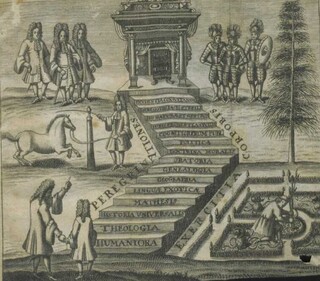Elite Mobility: Grand Tour and Peregrinatio Academica

Anton Wilhelm Schowart: Der Adeliche Hofmeister […] (Franckfurt 1693), frontispiece; Universitäts- und Landesbibliothek Sachsen-Anhalt, VD17: 23:646480H.
Social conventions of the late medieval and early modern period deemed particular forms of temporal mobility as appropriate and even desirable for members of elite groups. Both the grand tour of young aristocrats and the peregrinatio academica of university students were such institutionalized forms of elite mobility (and could be linked, as in the common case of a junior scholar serving as tutor to a young aristocrat and accompanying the latter on his grand tour). Compendia and vademecums that advised prospective travellers and extolled the merits of such voyages developed into a flourishing textual genre in-between scholarly and popular literature, in the wider framework of ars apodemica, the art of travelling.
The travels of journeymen – i. e., young craftsmen who had completed their apprenticeship and moved from one town to another to increase their experience in their profession – should be included in this category as well. Their social standing was most certainly not comparable to aristocrats, and the practices of mobility differed greatly between the elitist grand tour, the peregrinatio academica and the humble journeymen years. However, the basic principle remained fundamentally the same: A young man – nobleman, scholar or craftsman – was expected to travel for a limited time and gather experience, before settling down permanently and fulfil his socially accepted role. Compared to the more prestigious aristocratic and academic mobility, journeymen wanderings were only rarely discussed by contemporary scholarly literature – yet such learned reflections on the everyday mobility of craftsmen are by no means unknown.
Selected Literature:
Matthias Asche: „Peregrinatio academica“ in Europa im Konfessionellen Zeitalter. Bestandsaufnahme eines unübersichtlichen Forschungsfeldes und Versuch einer Interpretation unter migrationsgeschichtlichen Aspekten. Jahrbuch für europäische Geschichte 6 (2005), pp. 3–34.
Rainer Babel and Werner Paravicini (eds.): Grand Tour. Adeliges Reisen und europäische Kultur vom 14. bis zum 18. Jahrhundert. Beihefte der Francia 60 (Thorbecke 2005).
Mathis Leibetseder: Die Kavalierstour. Adlige Erziehungsreisen im 17. und 18. Jahrhundert. Beihefte zum Archiv für Kulturgeschichte 56 (Köln 2004).
Justin Stagl: A History of Curiosity: The Theory of Travel 1550 – 1800. Studies in Anthropology and History 13 (Chur 1995).
